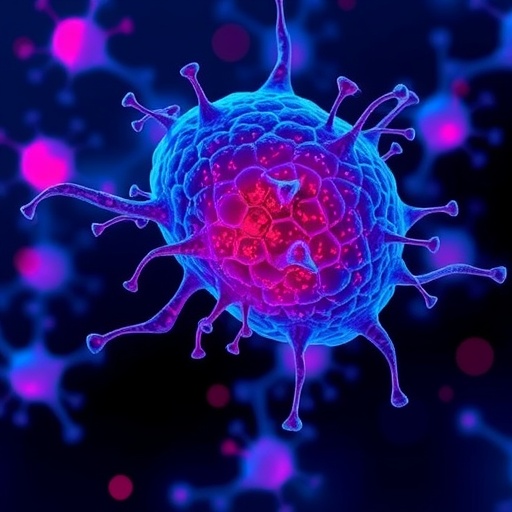In a groundbreaking advancement poised to reshape cancer therapy, scientists at the University of California San Diego have devised a novel method to obliterate cancer stem cells—those notoriously elusive agents driving tumor recurrence, metastasis, and resistance to treatment. Distinct from conventional approaches that often harm healthy tissue, this innovative strategy selectively reprograms cancer stem cells, instigating their self-destruction. Demonstrated initially in colon cancer, the approach employs artificial intelligence to pinpoint treatment targets tailored to a tumor’s unique genetic signature, promising a new era of precision oncology.
Cancer stem cells have long confounded researchers due to their mutable nature and ability to evade detection and treatment. Pradipta Ghosh, M.D., senior author and professor at UC San Diego School of Medicine, likens these cells to “shapeshifters” that adeptly switch identities, making them incredibly difficult to track and eradicate. This cellular game of hide-and-seek within tumors has stymied many therapeutic strategies, allowing cancer to persist and re-emerge even after aggressive treatment.
To outmaneuver these protean cells, the research team engineered a sophisticated machine learning platform named CANDiT (Cancer Associated Nodes for Differentiation Targeting). Unlike traditional linear genetic analyses, CANDiT constructs comprehensive gene networks starting from a pivotal gene critical to normal cell growth yet frequently lost in aggressive cancers. By examining these interaction networks within thousands of tumors, the tool identifies potential molecular targets capable of inducing differentiation—a process by which malignant stem-like cells revert to a more benign, less proliferative state.
Focusing their efforts on CDX2, a gene integral to colon tissue development and function frequently downregulated in aggressive colorectal cancers, the scientists harnessed CANDiT to analyze over 4,600 tumor genomes. This analysis revealed PRKAB1, a protein involved in cellular stress responses, as an unexpected yet promising target. Subsequent experiments engaged an existing pharmacological agent that activates PRKAB1, successfully restoring CDX2 functionality within colon cancer stem cells—essentially resetting the malignant program.
The consequences of this reprogramming exceeded expectations. Instead of merely arresting malignant behavior, the treated cancer stem cells opted to self-destruct. This spontaneous collapse, as described by Saptarshi Sinha, Ph.D., first author and interim director of the Center for Precision Computational Systems Network at UC San Diego, suggests that cancer stem cells are dependent on their aberrant identity for survival. Loss of this identity triggers apoptotic signaling cascades, thereby eliminating the source of tumor propagation and relapse.
To validate clinical relevance, the team leveraged UC San Diego’s HUMANOID™ Center, employing patient-derived organoids—miniaturized, lab-grown tumor replicas that preserve the structural complexity and heterogeneity of actual human cancers. These organoids enable precise testing of therapeutic interventions in an ex vivo human tissue context, streamlining the preclinical pipeline and enhancing translational potential. Their studies confirmed that PRKAB1 activation induces differentiation and subsequent collapse of colon cancer stem cells in these organoid models.
Importantly, the researchers developed a gene signature predictive of patient response to this therapeutic strategy, enabling stratification of individuals likely to benefit most. By employing computational simulations mimicking large-scale clinical trials, they applied this signature to over 2,100 patients across multiple independent cohorts. The results indicated a potential reduction in risk of cancer recurrence and mortality by up to 50% when utilizing treatments that restore CDX2 activity—an outcome heralding profound implications for patient prognosis.
This innovative approach addresses a long-standing challenge in oncology: targeting cancer stem cells which have historically eluded therapeutic control due to their plasticity and capacity for immune evasion. The CANDiT platform’s capacity to integrate multi-dimensional genomic data to identify patient-specific targets empowers clinicians to tailor interventions more precisely, circumventing the collateral damage often inflicted by conventional chemotherapy and radiation.
Beyond colon cancer, the research team envisions extending CANDiT’s utility to other formidable cancers such as pancreatic, esophageal, gastric, and biliary tumors. Collaborative efforts with colleagues across UC San Diego, including chemist Jerry Yang and surgical oncologist Michael Bouvet, advocate for refining therapeutic compounds and expanding the computational framework to encompass diverse tumor types, enhancing the generalizability and impact of this breakthrough.
Central to this work is an emerging conceptual paradigm that interrogates not only how to revert cancer stem cells to health but also why these reprogrammed cells initiate self-elimination. Deciphering the molecular mediators and signaling pathways responsible for this spontaneous apoptosis could unlock an arsenal of novel therapies, potentially rendering many cancers more amenable to curative treatment.
The marriage of advanced AI-driven network medicine with cutting-edge organoid technology constitutes a paradigm shift in cancer biology and therapeutics. By anchoring insights from high-throughput computational models to biologically faithful human tumor surrogates and meticulously designed gene signatures, this approach accelerates the journey from bench to bedside, fostering unprecedented precision and efficacy.
As Ghosh eloquently summarizes, the convergence of computational prowess and biological fidelity embodied in CANDiT represents not just a technical accomplishment but an inevitable evolution in oncology. This methodology promises a future where the “rules of cancer treatment” are rewritten—where elusive cancer stem cells no longer dictate outcomes but are instead rendered vulnerable to finely tuned, personalized therapies that empower patients with safer, more effective options.
Link to the full study can be found in the journal Cell Reports Medicine, underscoring a new chapter in targeting the resilient roots of cancer. This pioneering research offers hope that, through ingenuity and interdisciplinary collaboration, science can finally breach the defenses of cancer at its most fundamental level—a victory celebrated by patients, clinicians, and researchers alike.
Subject of Research: Cancer stem cells, targeted reprogramming, machine learning in oncology, colon cancer treatment
Article Title: AI-driven reprogramming of cancer stem cells triggers self-destruction in colon cancer models
News Publication Date: Not specified in the source
Web References:
https://www.cell.com/cell-reports-medicine/fulltext/S2666-3791(25)00494-X
Image Credits: Pradipta Ghosh/HUMANOID
Keywords: Cancer, Machine learning, Health and medicine
Tags: advanced cancer treatment methodsartificial intelligence in cancer therapycancer stem cell reprogramminggenetic signature of tumorsinnovative cancer research techniquesmachine learning in oncologynovel cancer therapiesovercoming cancer treatment resistanceprecision oncologyself-destruction of cancer cellstargeted cancer treatment strategiesUC San Diego cancer research





